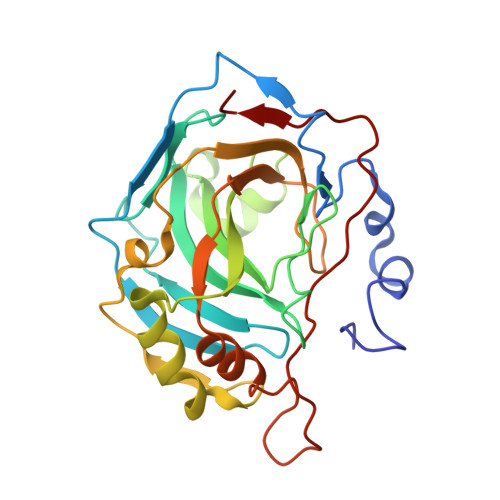Combining the tail and the ring approaches for obtaining potent and isoform-selective carbonic anhydrase inhibitors: solution and X-ray crystallographic studies.
Bozdag, M., Ferraroni, M., Nuti, E., Vullo, D., Rossello, A., Carta, F., Scozzafava, A., Supuran, C.T.(2014) Bioorg Med Chem 22: 334-340
- PubMed: 24300919
- DOI: https://doi.org/10.1016/j.bmc.2013.11.016
- Primary Citation of Related Structures:
4KV0 - PubMed Abstract:
5-(3-Tosylureido)pyridine-2-sulfonamide and 4-tosylureido-benzenesulfonamide (ts-SA) only differ by the substitution of a CH by a nitrogen atom, but they have very different inhibitory properties against the metalloenzyme carbonic anhydrase (CA, EC 4.2.1.1). By means of X-ray crystallography on the human CA II adducts of the two compounds these differences have been rationalized. As all sulfonamides, the two compounds bind in deprotonated form to the Zn(II) ion from the enzyme active site and their organic scaffolds extend throughout the cavity, participating in many interactions with amino acid residues and water molecules. However the pyridine derivative undergoes a tilt of the heterocyclic ring compared to the benzene analog, which leads to a very different orientation of the two scaffolds when bound to the enzyme. This tilt also leads to a clash between a carbon atom from the pyridine ring of the first inhibitor and the OH moiety of Thr200, leading to less effective inhibitory properties of the pyridine versus the benzene sulfonamide derivative. Indeed, ts-SA is a promiscuous, low nanomolar inhibitor of 7 out of 10 human (h) CA isoforms, whereas the pyridine sulfonamide is a low nanomolar inhibitor only of the tumor-associated hCA IX and XII, being less effective against other 9 isoforms. Thus, a difference of one atom (N vs CH) in two isostructural sulfonamides leads to drastic differences of activity, phenomenon understood at the atomic level through the high resolution crystallographic structure and kinetic measurements reported in the paper. Combining the tail and the ring approaches in the same chemotype leads to isoform-selective, highly effective sulfonamide CA inhibitors.
- Università degli Studi di Firenze, Polo Scientifico, Laboratorio di Chimica Bioinorganica, Via della Lastruccia 3, 50019 Sesto Fiorentino (Florence), Italy.
Organizational Affiliation:




















